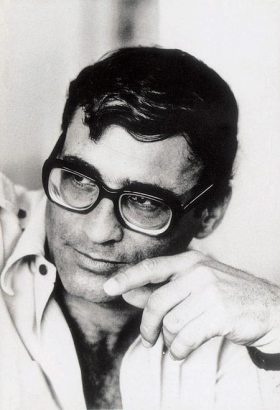Liam Hoare launches a new Fathom series in which our writers re-read classic texts. Past Continuous, Yaakov Shabtai’s novel of three friends set in 1970s Tel Aviv, was first published in Hebrew in 1977 as one continuous 280-page paragraph. (Breaks were mercifully inserted in the English translation.) Hoare makes the case that the novel created a rupture in the world of Israeli literature and, once more out of print, it is time for a reconsideration of a masterwork. We invite writers to submit their own ‘re-readings’.
1.
Yaakov Shabtai’s life was cut short by a heart attack in 1981 when the author was just 47-years-old. By then however, so the great scholar of Hebrew literature Robert Alter once declared, Shabtai ‘had already created a revolution in Hebrew prose.’ His career was brief but his crowning achievement monumental.
Born in Tel Aviv in 1934, Shabtai served in the IDF from 1952 to 1954 before moving to Kibbutz Merhavia near Afula in the Jezreel Valley, where he began his life as a writer of short stories and plays, sketches and children’s books, among them The Wondrous Journey of the Toad (1965). In 1969, he left the kibbutz and returned to Tel Aviv, the city with which he would become identified, where he became a playwright of some, although not great success. In 1972, he published the short story collection Uncle Peretz Takes Off.
Emerging with a new generation authors like A.B. Yehoshua and Amos Oz, Alter observes that in Uncle Peretz Takes Off, we see the seeds of Shabtai’s bleak yet humorous style — one he calls ‘supple, evocative, unstrained, free of formulaic mannerisms and in touch with the immediacy of spoken Hebrew while richly exploiting the resources of the modern literary language.’ In evidence too are the themes that were occupying him: the remnants of Jewish Europe and Israel’s pioneer generation living and dying in Tel Aviv.
The merits of Uncle Peretz Takes Off notwithstanding, the literary critic Alan Lelchuk argues that little in these stories nor his plays ‘prepared the reader for the novelistic talent he was to reveal’ in 1977. This was to be the year of two revolutions. Concurrent to the mahapach — when Menachem Begin’s Likud dislodged the Labor Party after nearly 30 years of continuous rule — Shabtai altered the landscape of Israeli literature forever with the first and only novel he would complete in his lifetime: Past Continuous.
Written in the original Hebrew as one unbroken paragraph stretching over more than 275 pages, weaving present and past into one continuum, obsessed by decline and death, riddled with decay, and shot through with guilt and anxiety, Past Continuous portrays a society on the verge of a nervous breakdown and, in so doing, ‘realises the most radical imaginative possibilities of [the] new prose’ style Shabtai played around with in his short stories, Alter writes. In ‘serpentine, elaborately metaphorical sentences,’ Shabtai subtly wove ‘in and out of different times and different levels of consciousness, conjuring up a vision of all things of value crumbling under time’s corrosive touch.’
2.
Into the excellent English translation by Dalya Bilu, first published in 1985, paragraph breaks were (mercifully) inserted, and encapsulated in the first two, relatively simple seven-line sections are the plot and structure of Past Continuous as well as its constellation of themes and obsessions:
Goldman’s father died on the first of April, whereas Goldman himself committed suicide on the first of January — just when it seemed to him that finally, thanks to the cultivation of detachment and withdrawal, he was about to enter a new era and rehabilitate himself by means of the ‘Bullworker’ and a disciplined way of life, and especially by means of astronomy and the translation of the Somnium.
The only one to notice the peculiar connection between the date of Goldman’s death and that of his father’s was Caesar, who even remarked on it a few days after Goldman’s funeral while standing in the kitchen with Israel, who was making them both a cup of tea — but he mentioned it only as an anecdote without any significance, because by then he had thrown in the towel and was no longer prepared to make the slightest effort not connected with his own immediate needs.
The novel, then, will begin with one death and the funeral of Goldman’s father and end with another via suicide. It will occupy itself with the lives of three characters: Goldman, Caesar, and Israel, all of whom are adrift and disenchanted in their own way and represent the lost souls of the sabra generation born of the pioneers who made aliya in the early years of the British Mandate. Everything else that is folded into the novel — that has to do with Goldman, Israel, and Caesar and those associated with them — is bookended by these two deaths and in some sense shaped by them. Yet the timeframe is not a constraint, for Shabtai’s manipulation of language and tense means that Past Continuous seamlessly transitions from near to distant past and back again and between perspectives.
Goldman’s life — like those of Caesar and Israel — is indeed defined by inertia and purposelessness. It was shaped early on by his father, a man with a tyrannical and cold bent who believed error was a sin and strove to impose his views upon the world, driving away friends and loved ones in the process. He wanted his son to be an engineer but instead Goldman took up the law and his profession ‘filled him with a feeling of waste and failure.’ As a distraction, ‘he read widely and unsystematically,’ attempting to find solace in all manner of fields from death notices in the newspaper to the aforementioned Somnium, a seventeenth-century novel written in Latin by the German astronomer Johannes Kelper. Salvation, a new start, was always on the horizon, but in the end, Goldman could not bear the experience of being in the world.
‘I envy Caesar,’ Goldman tells Israel. ‘He lives as if life was a game that goes on forever. He’s got no problems. He’s a real butterfly.’ Caesar is a photographer; at his core, a selfish hedonist and pleasure-seeker. Shabtai writes of Caesar that he lives ‘effortlessly and guiltlessly, even when the lie’ he was spinning ‘was so obvious that it hit you in the eye.’ He is a louche: a drinker of whiskey and collector of pornographic photographs unable to sustain a monogamous relationship with any of the women who have passed through his life, his apartment, or his bed. He lusts after a woman while they remain unobtainable, though as soon as they offer themselves to him, he immediately gets cold feet and loses interest. He is anxious about growing old and going bald, a condition he treats with a smorgasbord of lotions and potions.
He shares his three-room apartment with Israel, from whom he takes not a penny in rent. ‘Ostensibly Israel made his living by copying musical scores,’ Shabtai writes, ‘but actually he lived off Caesar.’ His ‘humiliating dependence’ leads to Israel to adopt a somewhat ‘monastic way of life without setting himself any clear aim,’ a kind of counterweight to Caesar’s penchant for self-gratification. On that note, when the apartment is otherwise occupied, for the sake of privacy Israel is reduced to wandering the streets of Tel Aviv until the coast is clear. Thoughts in his darkest moments turn to Ella, the one who got away. ‘Israel was as sick of himself as he was envious of Caesar.’
3.
Death is the leitmotif of Past Continuous. Again and again, the novel reaches back into the past to recall how characters shot themselves in the mouth or threw themselves off of third-story balconies in bids to end their sadness and disappointment. Death impresses itself upon the aimless lives of Goldman, Caesar, and Israel. The tragic passing of Goldman’s sister was a ‘sorrow which cast a shadow over his life’ that ‘could not be wiped out with words,’ while his father’s pronouncement that suicide ‘showed nothing but cowardice and egotism’ weighs heavily upon him. Goldman says to Israel, ‘You can beat death at its own game. The only trouble is that once you’ve done it you can never take it back again, and the victory might prove rather a hollow one in the end.’
But in a much larger sense, Goldman, Caesar, and Israel — and indeed, the specific milieu about which Shabtai writes — are really being shaped and defined by events happening off-stage in the novel, alluded to early on as the ‘external changes and difficulties’ challenging Goldman’s father’s Socialist and Zionist view upon the world, one defined by ‘plain living, hard work, morality, and progress in the most elementary sense of the words.’ He disliked his former friend Tzimmer, for in Goldman’s father’s view, his work ‘was nothing but corruption and paid idleness … pure and simple theft’:
The drawers full of pens and pencils and note papers in Tzimmer’s house, all stolen from the Histadrut, and the renovations which took place in Tzimmer’s apartment after all the election campaigns in which he was so active, not to mention the new furniture he was always buying and the new refrigerator, and the trip to America, all of which he could never have paid for out of his salary, not to mention the scandalous favouritism and preferential treatment he meted out to himself and his family and friends, and all kinds of irregularities and fringe benefits — free tickets to concerts and the theatre, vacations at Histadrut rest homes without waiting his turn, all kinds of trips, dinners, and so on. …What made things even worse was that Tzimmer accompanied all these misdeeds with moralistic speeches about the decline of the state and the labour movement and perpetrated them under a cloak of hypocritical socialism.
This is as explicit as Shabtai gets when it comes to the political and historical circumstances in which his novel was forged — but considerations of his work are impossible without them. Up above, as Shabtai wrote Past Continuous, the scenery was collapsing around the Alignment-led government of Yitzhak Rabin. Rabin succeeded Golda Meir in 1974, one year after the Yom Kippur War. Inflation hit almost 40 percent that year and remained stubbornly high thereafter. The settler movement Gush Emunim was formed and set about challenging the state’s authority in the occupied territories. Six Arab Israelis died in the Land Day demonstrations of March 1976. And the government was hit by wave after wave of scandal. In March 1977 Asher Yadlin — nominee for the Bank of Israel governorship — was sentenced to five years imprisonment for bribery related to dodgy real estate deals. Housing minister Avraham Ofer, also implicated in the Yadlin affair, committed suicide. In the same month Yadlin was sentenced came the Dollar Account affair: the discovery that Rabin’s wife, Leah, held a then-illegal foreign bank account in the US.
Down below, a Mizrahi awakening was taking place. Begin began cultivating support among Jews from north Africa and the Middle East living in Israel’s transit camps and development towns in the 1950s. By the 1970s, their resentment towards the Labor-Ashkenazi establishment was boiling over. When Amos Oz visited Beit Shemesh in 1982 while researching In the Land of Israel (1983), he encountered residents’ overt hostility, even rage, towards the Alignment and Shimon Peres, the Histadrut, the kibbutzim, and the Ashkenazim. ‘All my life I’ve been the bottom and you’ve been the top,’ one guy told Oz. ‘The Mapainiks wiped out everything that was imprinted on a person,’ said another. ‘Why did you have to make fun of their beliefs?’ asked the next:
I’ll tell you what shame is: they gave us houses, they gave us the dirty work; they gave us education, and they took away our self-respect. What did they bring my parents to Israel for? I’ll tell you what for, but you won’t write this. You’ll think it’s just provocation. But wasn’t it to do your dirty work? You didn’t have Arabs then, so you needed our parents to do your cleaning and be your servants and your laborers. And policemen, too. You brought our parents to be your Arabs.
The effect of the revolutions from above and below was a political and cultural eclipse, and in Past Continuous, a collective nervous breakdown. The power of those about whom Shabtai writes — the austere pioneer generation that built the State of Israel and their wayward sons and daughters — was fading. The foundations of the Israel that those European immigrants had helped to construct were crumbling. Their world of potato pancakes and pickled herring and Yiddishkeit, of seafront cafes and Polish and tea sets from Czechoslovakia was vanishing. And Tel Aviv itself — about which Shabtai writes beautifully — was changing beyond recognition, giving way to a city his characters no longer recognise. ‘It’s not my town any more, and it never will be. It’s just a pile of shit,’ Goldman says:
From one day to the next, over the space of a few years, the city was rapidly and relentlessly changing its face, …and Goldman, who was attached to these streets and houses because they, together with the sand dunes and virgin fields, were the landscape in which he had been born and grown up, knew that this process of destruction was inevitable, and perhaps even necessary, as inevitable as the change in the population of the town, which in the course of a few years had been filled with tens of thousands of new people, who in Goldman’s eyes were invading outsiders who had turned him into a stranger in his own city, but this awareness was powerless to soften the hatred he felt for the new people or the helpless rage which engulfed him at the sight of the destructive plague changing his childhood world and breaking it up.
As that world changes and breaks apart, Shabtai’s characters break down, all entering into states of personal or ideological crisis. Erwin had been a kibbutz member in his youth but now ‘these principles had been subjected to an almost imperceptible process of erosion until they were distorted beyond recognition.’ Manfred believed the genuineness and simplicity of Zionism would give birth to a better world but comes to give up on it, wandering off first towards communism and then Christianity. Joseph Levitan, who works for the Histadrut, worries about the social order and comes to the view that man in the cities ‘was subject to constant economic and emotional stress’ and the victim of alienation and the loss of freedom. He dies of a heart attack.
And then there’s Goldman. He once tried to ‘return to the bosom of Judaism’ but his religion ‘had nothing to sustain it and it dwindled and died because it was a religion without belief.’ Life, he comes to feel, ‘was always behind him and he was being thrust towards his death and parting from everything.’ He tells Caesar, whose own child from a previous marriage has leukaemia, that his life is but a journey towards death. In his final days and weeks, he takes up the Somnium again, working day and night on its translation, and when on the fourth day of not hearing from him, Israel entered Goldman’s study, he finds him ‘lying dead on the bed … with an empty bottle of sleeping pills and an empty bottle of brandy beside him.’
4.
Past Continuous is an imperfect and yet extraordinary novel. It demands to be read slowly and attentively, falling in and out of love with it in the process. A work of tremendous linguistic and thematic depth, it is a novel of nervous mental collapse structured like a nervous mental collapse — like a circle in a spiral, like a wheel within a wheel / never ending or beginning on an ever-spinning reel. There is a seamless quality to the manner in which Shabtai slides effortlessly between near and distant past, weaving the one into the other, evidence of a writer in full control of a potentially-unwieldy narrative device.
In his introduction to the English translation of S. Yizhar’s Preliminaries (1992), Dan Miron — the Hebrew literary scholar who edited and completed Shabtai’s second and unfinished novel, Past Perfect (1984) — calls Past Continuous ‘a towering achievement’ and ‘the most important development’ in Israeli prose fiction since the publication of Yizhar’s own two-volume war epic, Days of Ziklag, in 1958. He summarises best what precisely Past Continuous represents, a novel whose ‘future perfect narrative modality penetrated the very core of Israeli literary consciousness’:
It was Shabtai who devised this narrative mode, invoking it specifically to explore the decline and fall of Israel of the pioneers, as well as the gradual evaporation of the Zionist dream of creating an authentic Jewish place for an authentic new Jew, who would live primarily in concrete rather than in historical time. …The novel, astounding in its density, vividly portrays a whole tribe of new decrepit and dying pioneers in conjunction with their hedonistic descendants. It continuously shifts between the novel’s present (the 1960s), the heroic past, and the projected future, all time-frames coming together to form a comprehensive anatomy of the dismal failure of the pioneers’ dream and the of the degradation of Tel Aviv, once an authentic Jewish Zionist town, to a mere urban chaos.
Shabtai’s ‘truncated career,’ Miron concludes, ‘was dedicated completely to the writing of what the author believed was the last elegiac chapter in the cultural history of Zionism.’ For Alter, meanwhile, Past Continuous was ‘a magisterial solution to a dilemma of style that has troubled most Israeli writers’ until Shabtai, Oz, and Yehoshua came along:
The older tradition of modern Hebrew writing, originating in Europe, drew its language chiefly from the sacred texts and developed a densely allusive style that was often a kind of virtuoso play with phrases from the classic Hebrew sources. The first generation of native speakers of a revived Hebrew, who came of age as writers roughly around the time of the establishment of the state of Israel, did not, as one might imagine, introduce a new colloquial language but, on the contrary, used a self-consciously literary prose that was often a laboured imitation of the clichés of European fiction.
Past Continuous created a rupture in the world of Israeli literature. In the same way Israel was forever changed by the mahapach, Shabtai’s novel is a marker in time that separates those novels that came before it with those written in its wake. An ambitious novel like Oz’s The Same Sea (1999) with its blending of prose and poetic styles owes something not only to S.Y. Agnon but the way in which Shabtai’s work expanded the definition of what constituted Hebrew prose. His legacy is also evident in the work of David Grossman, in whose use of repetition one hears distant echoes of Shabtai, and Zeruya Shalev, whose novels like Love Life (1997) and Husband and Wife (2000) are written in long, dense, breathless paragraphs whose sentences run onto one another.
Such was the scale of Shabtai’s achievement and the impact of Past Continuous that there is, it seems, no major twentieth century novelist to whom Shabtai has not been compared. Alter places Shabtai on a shelf along with Marcel Proust and Henry James. Irving Howe compares him favourably with William Faulkner. The literary scholar Nir Evron lists him besides Thomas Mann, Jean-Paul Sartre, and Saul Bellow. Other reviewers have compared Shabtai with Susan Sontag, while the allusion to James Joyce is hard to resist.
When Past Continuous was first published in English in 1985, writing in The New York Times, Lelchuk declared that it marked ‘a new plateau in contemporary Hebrew fiction’: a ‘long, complex, ambitious work of literature, part elegy, part etiology, with a music all its own.’ When Irving Howe reviewed Past Continuous for The New York Review of Books, he said: ‘I cannot recall, these past several years, having encountered a new work of fiction that has engaged me as strongly as Past Continuous, both for its brilliant formal inventiveness and for its relentless truth-seeking scrutiny of the moral life.’
Yet Past Continuous has always been something of a wandering novel, coming into print and falling back out of it again. Since 1985, it has found a home at several publishing houses: Pantheon/Schocken in 1989; Overlook Press in 2002; and Duckworth in London in 2004. Once more, however, Shabtai’s masterwork is out of print. It is time for a reconsideration, for Shabtai’s work is both a literary testament and historical document that cannot be overlooked. The translated Hebrew bookshelf that makes room for Oz, Grossman, and Yehoshua must carve out a space for Past Continuous too.




































